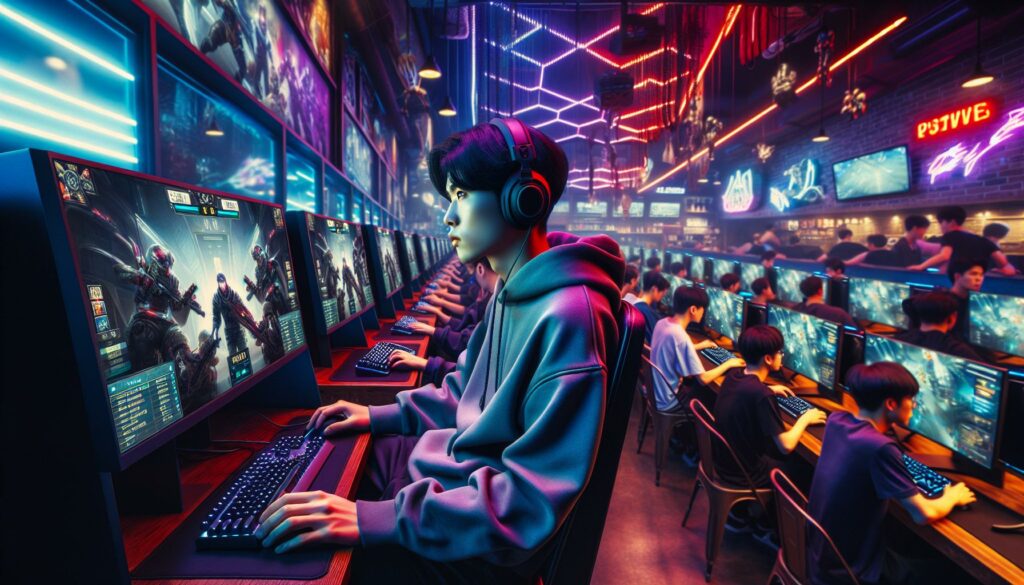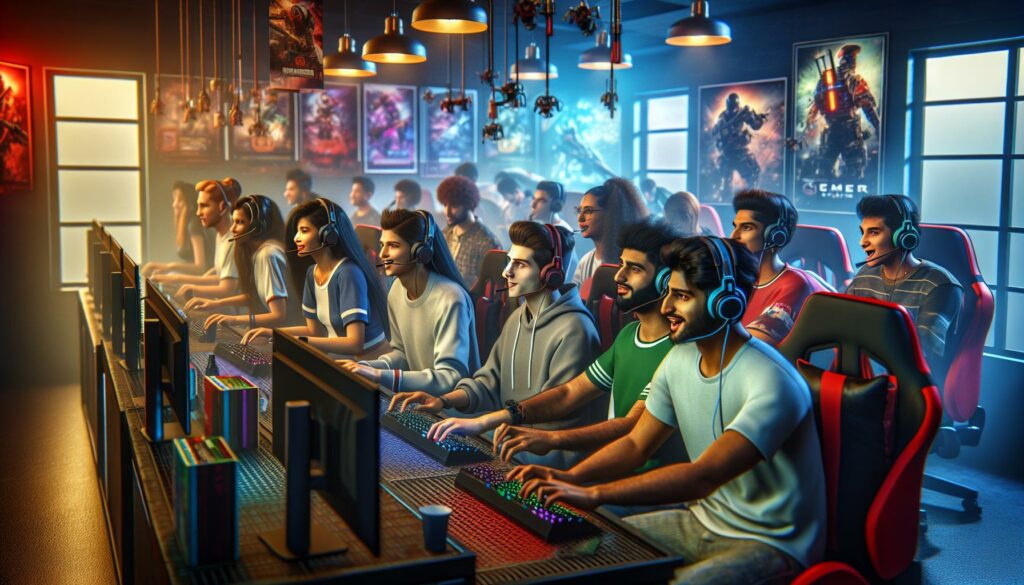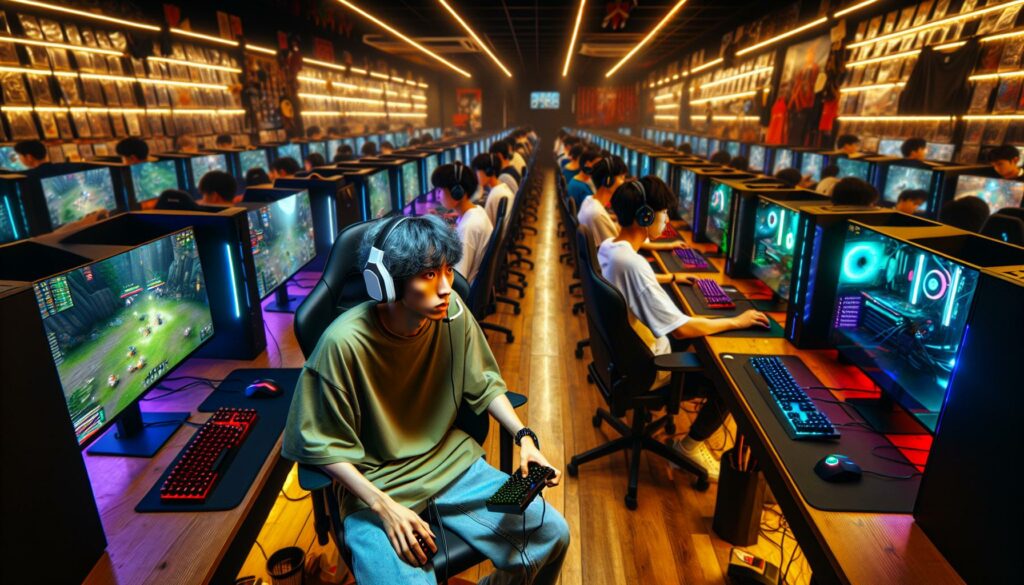South Korea stands as the undisputed champion of gaming culture, where professional gamers enjoy celebrity status rivaling K-pop stars. In a nation where high-speed internet is as common as kimchi, gaming isn’t just a hobby – it’s a way of life that has transformed into a multi-billion dollar industry.
From bustling PC bangs (gaming cafes) on every corner to massive esports arenas filling up with thousands of fans, South Korea has built an ecosystem that turns gaming dreams into legitimate career paths. The country’s relationship with competitive gaming runs so deep that even the government actively supports and promotes esports through dedicated departments and regulations. It’s a place where parents send their kids to gaming academies instead of piano lessons, and where professional gamers become national heroes.
Gaming Culture In South Korea
South Korea’s gaming culture emerged from a combination of technological advancement and social transformation. The nation’s rapid digitalization in the late 1990s created an environment where gaming flourished as both entertainment and sport.
Cultural Significance of PC Bangs
PC bangs transformed South Korean social dynamics by providing communal gaming spaces accessible 24/7. These gaming cafes serve as social hubs where players connect, compete and practice their skills at affordable rates of $1-2 per hour. Beyond gaming, PC bangs offer high-speed internet, comfortable seating and food delivery services – creating an ecosystem that supports extended gaming sessions. The prevalence of PC bangs (over 12,000 nationwide) demonstrates their integral role in Korean youth culture, with 1 in 3 teenagers visiting these establishments weekly. PC bangs facilitate competitive gaming through optimized hardware setups and stable network connections, making them essential training grounds for aspiring esports professionals.
Government Support for Gaming Industry
The South Korean government invests $177 million annually in gaming industry development through dedicated agencies like the Korea Creative Content Agency. Tax incentives encourage gaming companies to establish development centers, while specialized visa programs attract international gaming talent. The Ministry of Culture, Sports and Tourism operates multiple esports stadiums, including the $35 million Seoul Metropolitan Arena that seats 3,000 spectators. Government initiatives include mandatory gaming education in schools, esports curriculum development at universities and funding for gaming startups. These policies positioned South Korea as a global gaming hub, with the industry generating $15.3 billion in revenue in 2021.
Professional Gaming and Esports Infrastructure
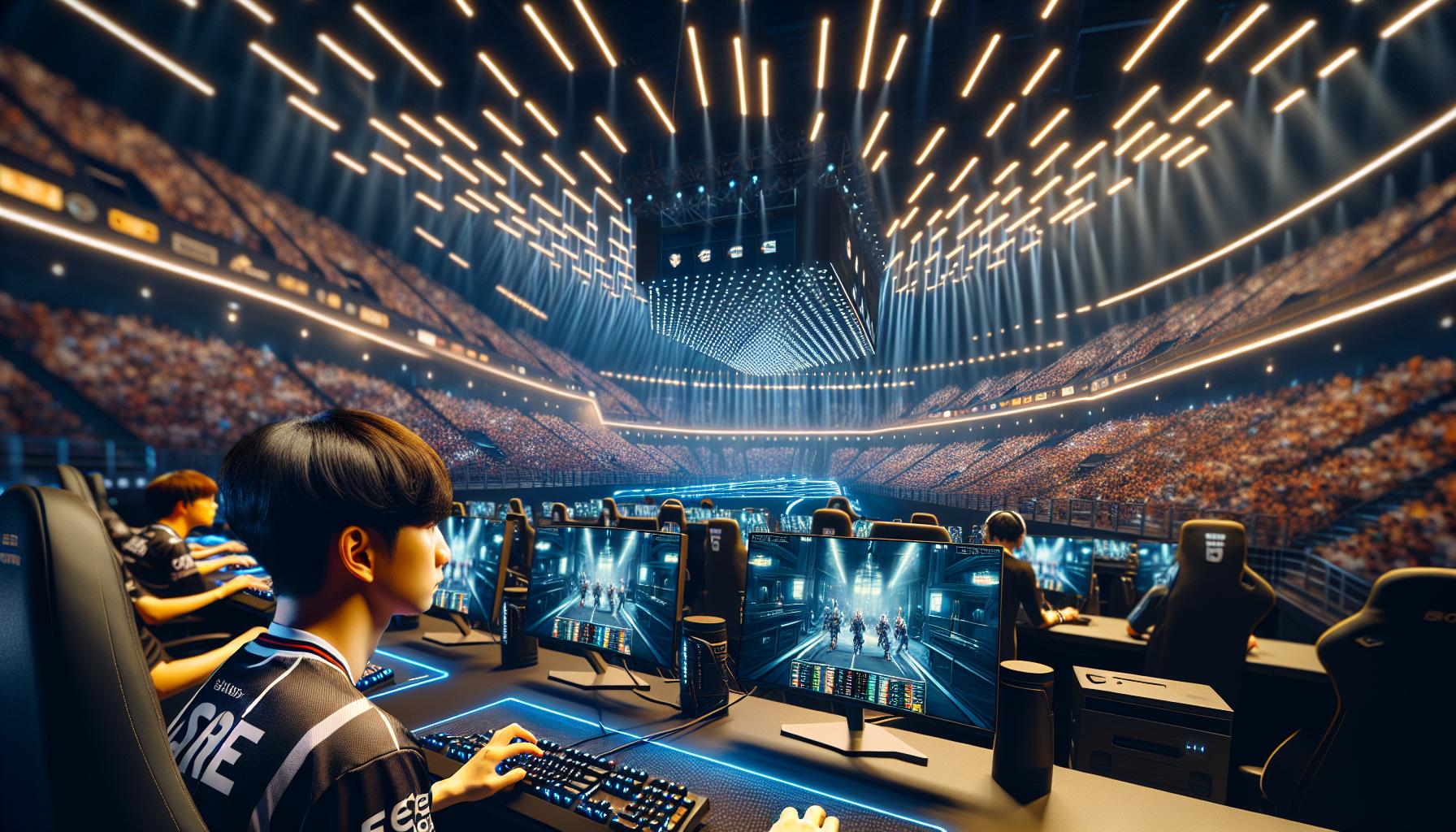
South Korea’s esports infrastructure stands as a global benchmark for professional gaming excellence. The country’s systematic approach to gaming development creates a sustainable ecosystem for aspiring professionals.
Korean Pro Gaming Teams and Organizations
Top-tier organizations like T1 Entertainment & Sports maintain elite rosters across multiple game titles including League of Legends StarCraft II Counter-Strike. Major telecommunication companies KT Rolster Gen.G Samsung Galaxy invest substantially in professional teams providing comprehensive support systems. These organizations operate dedicated training facilities equipped with advanced gaming setups streaming studios analysis rooms. Professional teams generate revenue through sponsorships merchandise sales broadcasting rights tournament winnings. Korean esports organizations set industry standards for player contracts offering competitive salaries healthcare benefits performance incentives.
Training and Development Programs
Elite gaming academies in South Korea implement structured training regimens focusing on mechanical skills strategic thinking team coordination. Professional players follow strict schedules incorporating 12-hour practice sessions physical exercise mental conditioning workshops. Organizations employ specialized coaching staff including strategy analysts sports psychologists physical trainers nutritionists. Training facilities feature advanced performance tracking systems video analysis tools team review sessions. Youth development programs identify talented players ages 13-16 providing pathways to professional careers through junior leagues amateur tournaments. Korean esports academies emphasize holistic development combining gaming excellence with education personal growth professional skills development.
Gaming as a Legitimate Career Path
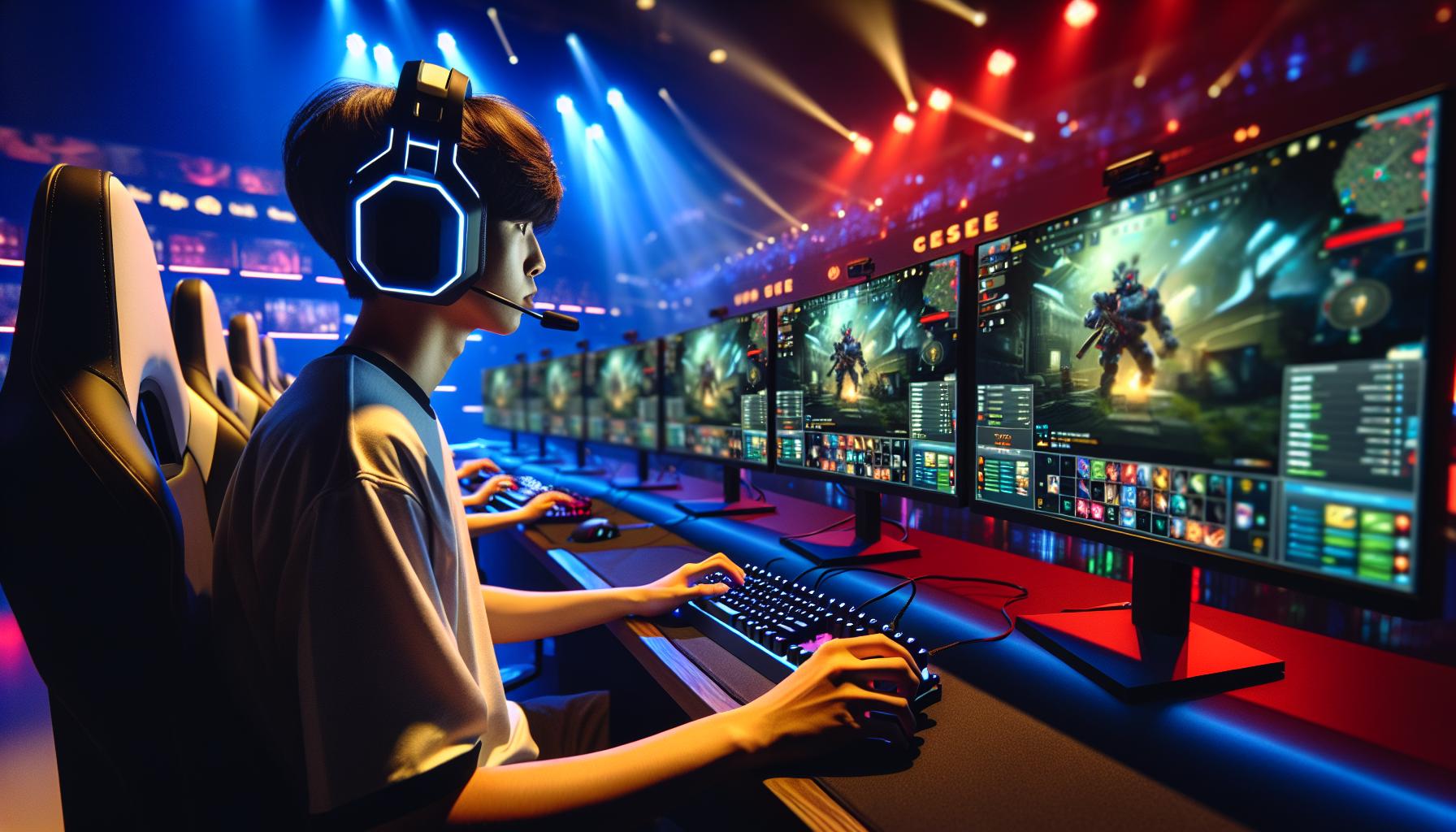
South Korea’s gaming industry offers established career paths comparable to traditional professions. Professional gamers receive comprehensive support systems backed by corporate sponsorships institutional investments.
Professional Player Status and Recognition
Professional gamers in South Korea hold celebrity status equivalent to entertainment stars. Major broadcasting networks feature gaming tournaments during prime-time slots attracting viewership numbers exceeding 10 million viewers. The Korean e-Sports Association (KeSPA) issues official athlete licenses recognizing professional gamers as legitimate sports competitors. Top players like Faker from T1 earn social recognition through presidential awards national honors. Gaming professionals receive specialized visas similar to traditional athletes enabling international tournament participation. Educational institutions incorporate esports programs into their curricula offering scholarships specialized degrees.
Financial Opportunities in Korean Gaming
The Korean gaming industry presents diverse income streams for professional players. Tournament prize pools reach $500,000 for major competitions with additional performance bonuses. Professional gamers earn base salaries ranging from $20,000 to $200,000 annually excluding streaming revenue sponsorship deals. Top-tier players generate additional income through:
| Revenue Stream | Annual Potential |
|---|---|
| Streaming | $100,000 – $1M+ |
| Sponsorships | $50,000 – $500,000 |
| Tournament Winnings | $100,000 – $2M+ |
| Brand Endorsements | $25,000 – $300,000 |
- Health insurance dental coverage retirement plans
- Housing allowances gaming equipment stipends
- Performance incentives revenue sharing opportunities
- Personal brand development marketing support
Social Impact of Gaming Culture

Gaming culture fundamentally shapes South Korean society through its influence on family dynamics, community relationships, and public health discussions. The integration of gaming into daily life creates both opportunities and challenges for social development.
Family and Community Perspectives
Korean parents recognize gaming as a potential career path, with 48% supporting their children’s gaming aspirations according to a 2022 survey. Gaming cafes serve as social hubs where families celebrate birthdays, couples go on dates, and friends gather for weekly gaming sessions. Community events centered around major tournaments transform neighborhoods into festive zones, with local businesses decorating storefronts and organizing viewing parties. Multi-generational gaming activities strengthen family bonds, as grandparents join their grandchildren in mobile games like Pokemon Go. Professional gaming success stories inspire community pride, with local gaming champions receiving ceremonial keys to their cities.
Gaming Addiction Concerns
South Korea classifies gaming addiction as a mental health condition, with treatment centers reporting 14% of teenagers showing problematic gaming behavior. The government mandates gaming curfews for minors under 16, restricting access between midnight and 6 AM. Healthcare providers offer specialized treatment programs combining cognitive behavioral therapy with digital detox protocols. The National Center for Gaming Disorders operates 12 regional clinics providing free counseling services. Gaming companies implement mandatory break systems in their games, displaying health warnings after 3 consecutive hours of play. School counselors receive specialized training to identify early signs of gaming dependence, connecting at-risk students with support services.
Educational Integration
South Korean educational institutions integrate gaming into their curriculum from primary schools to universities. This systematic approach creates a structured pathway for students interested in gaming careers while maintaining academic excellence.
Gaming Programs in Schools
Korean schools incorporate gaming education through specialized after-school programs focused on esports development. Elementary schools offer basic computer literacy courses that include gaming fundamentals while middle schools feature competitive gaming clubs supervised by professional coaches. High schools participate in the National Student Esports Championship with 2,000 teams competing annually across multiple game titles. Notable programs include the Seoul Game Academy which partners with 50 high schools to provide professional gaming instruction alongside traditional subjects.
Gaming-Related University Degrees
Top universities offer comprehensive gaming-focused degree programs that combine technical skills with business knowledge. Korea University launched a Gaming Engineering program in 2017 attracting 500 students annually. Yonsei University provides an Esports Management degree covering game design analytics team management marketing strategies. The Seoul Game Academies network connects 15 universities offering specialized courses in programming artificial intelligence digital art game development. These programs maintain an 85% employment rate with graduates securing positions at major gaming companies such as Nexon NC Soft Pearl Abyss.
Impact on Global Gaming Industry
South Korea’s gaming ecosystem shapes global gaming trends through innovative game development practices technical advancements. The country’s influence extends beyond its borders, transforming how games are created played worldwide.
Korean Gaming Companies and Developers
Korean gaming giants like Nexon Pearl Abyss drive innovation in the global gaming market. Nexon’s MapleStory redefined free-to-play gaming mechanics, generating $2.7 billion in revenue since its launch. Pearl Abyss’s Black Desert Online demonstrates Korean developers’ expertise in creating graphically advanced MMORPGs, reaching 50 million players globally. NCSoft pioneered cross-platform integration with titles like Lineage, establishing industry standards for mobile gaming transitions. These companies excel in implementing microtransaction models live service games that generate consistent revenue streams through regular content updates player engagement systems.
International Influence and Trends
Korean gaming practices reshape global industry standards competitive gaming frameworks. Major publishers adopt Korean-style gaming cafes across Southeast Asia North America, with over 100 franchised locations opening in 2022. The battle royale genre gained prominence through PUBG Corporation’s groundbreaking title, inspiring numerous successful adaptations worldwide. Korean mobile gaming strategies influence international developers, particularly in monetization systems social features. Leading companies like Riot Games establish regional headquarters in Seoul to tap into Korea’s gaming expertise talent pool. Esports organizations worldwide implement Korean-style training regimens team management structures, recognizing their effectiveness in developing competitive players.
World’s Esports Capital
South Korea stands as a shining example of how gaming can evolve from a recreational activity into a thriving cultural phenomenon and economic powerhouse. The nation’s comprehensive support system spanning government initiatives professional organizations and educational institutions has created an environment where gaming excellence flourishes.
This unique ecosystem continues to shape the global gaming landscape while maintaining its distinctive cultural identity. With ongoing technological advancements and growing international influence South Korea’s gaming culture shows no signs of slowing down. The country’s success story serves as a blueprint for nations looking to develop their own gaming industries and demonstrates how gaming can become a respected mainstream career choice.

